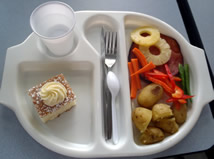Segregation in the school hall at lunchtime and the stigmatisation of receiving free school meals (FSMs) from the state are key factors for parents who are opting for sending children to school with packed lunches instead, according to a new study from the Institute for Social and Economic Research.
FSMs are a component of state support for families on low income – and trigger payment of the Pupil Premium, the extra targeted funding for schools to help those from poorer backgrounds – but take up amongst the entitled is dropping. Over 1.1 million children are entitled to FSMs but around 300,000 are not taking up or registering for the benefit.
The financial cost to parents is estimated at around £400 a year per child, but missing out on the important nutritional content of the meal may also have a detrimental impact on the health of the nation’s poorest children. Schools also lose extra funds of £600 per child from the Government’s Pupil Premium scheme.
The research by Angus Holford at ISER, based at the University of Essex, found the Scottish government’s experiment to introduce universal entitlement to FSMs in areas of high deprivation raised take-up among those already entitled both during and after the experiment. Elsewhere, anonymised payment schemes – where parents pre-register to pay or to receive the benefit online for example – also raised take-up substantially.
The study looked at every primary school in Scotland and analysed the choices of children and parents there to see that making sure FSM-registered children are not identifiable is only one way to improve participation. Getting more unregistered pupils to take school meals will also be effective. Higher peer-group take-up both reduces the probability that an FSM-participant is forced to eat apart from his friends, and also sends a signal that school meals are enjoyable and of good quality.
The research will be of interest to policy makers and local authorities who are anxious for schools to promote take up of FSM but face the challenge of asking reluctant families to reveal their financial status to school staff. Schools are only able to claim the government’s new social mobility money, the Pupil Premium, for children whose parents have declared themselves eligible for FSM.
Local authorities have asked schools to actively encourage parents to sign up for FSM in order to access the additional £600 per pupil, a new government measure to increase attainment among children from low incomes.
Mr Holford, explained his research shows peer pressure and prejudice is affecting parents’ choices in applying for FSM.
“Peer pressure is undoubtedly important. Results show that in a typical school a 10 percentage point rise in peer-group take-up would reduce non-participation by almost a quarter. This is both because children would rather eat with their friends, and because people set greater store by the actions of their friends and classmates than information from authorities. Schools should let all classmates eat together, at the same time, to reduce any stigmatisation. Introducing anonymised payment schemes would also dramatically increase take-up. Government initiatives to increase take-up would be best targeted at year groups in the most deprived areas rather than at individuals, as children are obviously responsive to the choices made by their school friends.”
Claire Rick, Children’s Food Trust spokesman:
“At a time when many families are struggling to make ends meet, it’s never been so important to do everything we can to encourage them to register for free school meals if they qualify, and to make sure that children then take up their meals once they’re registered. Research shows that when children eat better, they do better in class, and for many children their school lunch can be the only proper meal they eat in a day. Strategies like allowing all children to eat together – regardless of the type of lunch they have, and making sure that children having free school meals can’t be identified as such, are good starting points for any school wanting to work on this.”
This research was entered into the ESRC Early Career Impact Award 2012.
Angus Holford joined the Cabinet Office Behavioural Insights Team on an ESRC-funded Research Fellowship from October.
This research featured in The Observer on Sunday 23 September.
Take-up of Free School Meals: price effects and peer effects by Angus Holford is published by the Institute for Social and Economic Research: working paper series 2012.
For all media enquiries please contact Louise Clarke Cullen, Communications Manager at ISER on 0777 1792393 or 01206 873087 or lcullen@essex.ac.uk
